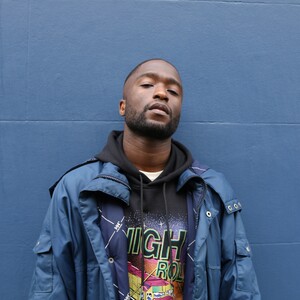You are viewing your 1 free article this month. Login to read more articles.
Express yourself
Iggy London explains the genesis and thinking behind Mandem—a powerful and poignant anthology of Black male expression.
I have always been a homebody. Rarely going beyond the comfort of my own humble abode. The outside was for people who craved attention. Who hadn’t resolved something deep and dark in them, causing them to want to spend money they didn’t have and go to restaurants with people they didn’t like. Well, sorry world. I’ve got news for you! That wasn’t going to be my fate. It wasn’t in my nature nor in my blood. In fact, my brothers were the same. I remember us running back home from school, frantically looking for our keys, swinging the door open and hearing the pleasant satisfaction of the loud thud that would follow, with the door hitting our bums as it closed. Away from the chaos and problems of the outside world.
But as we grew up, we started to realise that home became a sanctuary out of necessity rather than anything else. The aggressive frisking of a stop and search regime could do that to you. The closing down of youth clubs and public parks could do that too. The people in the area changed. Didn’t look quite the same as they did before. Seeing your friends move further and further out of London because the council had relocated them elsewhere. Birmingham. Cardiff. Ipswich. MSN was the only common place. Our centre of gravity.
As Black boys, we started to age quicker than our counterparts. Being perceived as men far earlier than we had imagined. The novelty of our youth as Black boys tends to wear off quickly, leaving a young man who has broad shoulders with boots too big to fill. A world of children who were guilty of falling in place and falling apart. Into a dangerous world not quite built for them.
Home comfort
So, now a little older, it doesn’t take a genius to realise why I preferred to be at home. The only place we could ever truly feel safe as Black boys. Writing notes underneath our pillows before we slept. Notes that would tell our truth, even if nobody else on the outside world would believe us.
This is one of the reasons why Mandem was created. It is an exception to the rule. That young Black boys and men shouldn’t have to figure out life on their own in the closure of their homes, where the true dark and deep secrets were kept. That we, as a group of people, have more similarities than differences and we should share them. To finally be able to write in a language that was recognisable to us mandem. To validate the way we spoke when we were among each other.
If you were to ask a young, Black boy why they were the way they were, what were the key events of their life that made them the person they were today, I don’t think they would have the words to explain it. Even if I could, I’m not sure I would do it justice. A masculinity always theorised and politicised but never realised. I remember sixth-form. A young boy celebrates his 18th birthday, and our teacher brings out a cake for him. When it was time for his speech, he said he was surprised to have reached this age. He thought living to the age of 18 was commendable. As if 18 wasn’t a milestone in which one could count themselves an adult; a man. But as if, to have lived to the age of 21 was a full life in itself. Anything else was a gift from God. James Baldwin says in The Fire Next Time: “There seemed to be no way whatever to remove this cloud that stood between them and the sun, between them and love and life and power, between them and whatever it was that they wanted.”
A clearer path
Sometimes this is why I think Mandem was written. To remove the invisible cloud that stood between myself and the sun. To remove the cloud that stands anywhere between us boys and the sun. J D Salinger’s Catcher in the Rye sums it up the best: “Many, many men have been just as troubled morally and spiritually as you are right now. Happily, some of them kept records of their troubles. You’ll learn from them—if you want to. Just as some day, if you have something to offer, someone will learn something from you. It’s a beautiful, reciprocal arrangement. And it isn’t education. It’s history. It’s poetry.”
Mandem is a collection of stories designed to make you laugh, to make you cry—or perhaps you may not feel anything at all when you read them. I hope you have the courage to read them outside the comfort of your own home, like I finally did. To live fuller lives closer to the sun. But underneath it all, Mandem’s true purpose is for people, like me, to learn something from the beautiful and personal stories that are told within the book. So another person may open it and learn something and offer something to someone so that they may learn something. And so on and so forth. It is truly history in the making. It is truly poetry.
Iggy London is an award-winning filmmaker, artist and writer. Mandem, an anthology of essays exploring Black male expression edited by Iggy London, was published by Jacaranda in hardback in March 2023 (9781913090944). Contributors to the book include Ashley Hickson-Lovence, Jeffrey Boakye, Yomi Sode and Jordan Stephens.




















